April 13, 2025 | 19:58 GMT +7
April 13, 2025 | 19:58 GMT +7
Hotline: 0913.378.918
April 13, 2025 | 19:58 GMT +7
Hotline: 0913.378.918
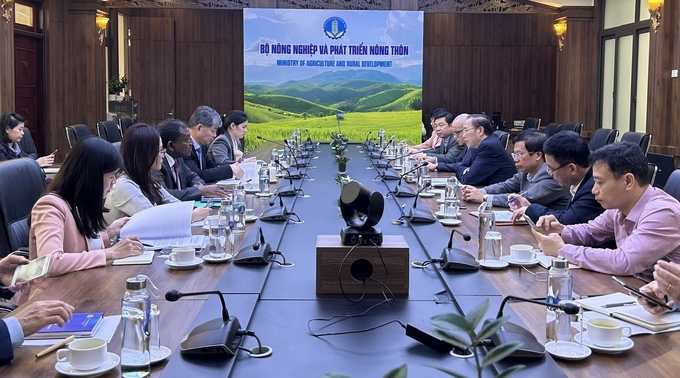
Deputy Minister of the Ministry of Agriculture and Rural Development, Phung Duc Tien, received and held discussions with Mr. Hua Liu, Deputy Director General of the International Atomic Energy Agency (IAEA). Photo: Linh Linh.
On the afternoon of March 21, Deputy Minister of Agriculture and Rural Development Phung Duc Tien met and talked to Mr. Hua Liu, Deputy Director General of the International Atomic Energy Agency (IAEA).
During the meeting, Deputy Minister Phung Duc Tien stated that Vietnam's agriculture sector values the results of cooperation with the IAEA, particularly now that Vietnam is a member of the International Atomic Energy Agency's Board of Governors for the term 2021-2023. Throughout this time, the Ministry of Agriculture and Rural Development has taken an active role in interdisciplinary task teams.
The two parties have collaborated to use nuclear technology to support agricultural development. For example, they have developed a model for managing fruit fly pests in dragon fruit using insect sterilization techniques on a large scale. They have also used nuclear technology for mutation breeding to create rice varieties resistant to drought, salinity, and flooding.
The IAEA has also provided technical support, molecular biology equipment, research tools for diagnosing animal diseases, various forms of animal diseases transferred to humans and across borders, and improved laboratory testing capabilities, among other things.
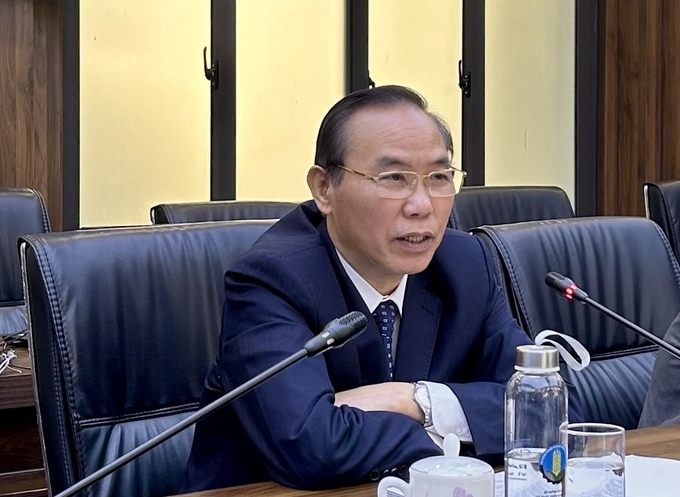
Deputy Minister Phung Duc Tien stated that the agriculture sector of Vietnam highly appreciates the results of cooperation with the IAEA. Photo: Linh Linh.
Furthermore, Vietnam and the IAEA are working together to create a network of collaboration across nations in order to increase capacity and share experiences for more successful nuclear-based agricultural interventions. With an effective cooperation framework, Deputy Minister Phung Duc Tien proposed that the IAEA continue to assist Vietnam in training human resources, improving laboratory capacity, and funding projects involving the use of sterile insect techniques to contribute to sustainable production and food security.
The Deputy Minister also requested that the IAEA help construct a research and training center for the use of atomic energy in agricultural development. There were also suggestions for research on diseases transmitted from animals to humans in pig farming contexts, as well as antibiotic resistance in poultry farms.
The leadership of the Ministry of Agriculture and Rural Development also seeks IAEA assistance in restructuring the Department of Animal Health's laboratory system following the completion of the project to merge the Veterinary Department's laboratories into the National Central for Veterinary Diagnosis 1 and 2.
After hearing a brief presentation of agricultural cooperation successes, Mr. Hua Liu, Deputy Director General of the International Atomic Energy Agency (IAEA), concluded that both parties worked efficiently to achieve favorable results in the agricultural sector.
Mr. Liu noted that the IAEA works closely with the Ministry of Science and Technology, as well as research organizations run by the Ministry of Agriculture and Rural Development.The International Atomic Energy Agency will continue to support Vietnam in the disciplines of breeding selection and disease management.
Last October, the IAEA established the Atom4food program to secure food security by leveraging nuclear technology to help provide cleaner and safer food, boost nutrition, and adapt to climate change problems. This IAEA effort connects laboratories to farmers through the use of atomic energy, increasing crop productivity and disease resilience.
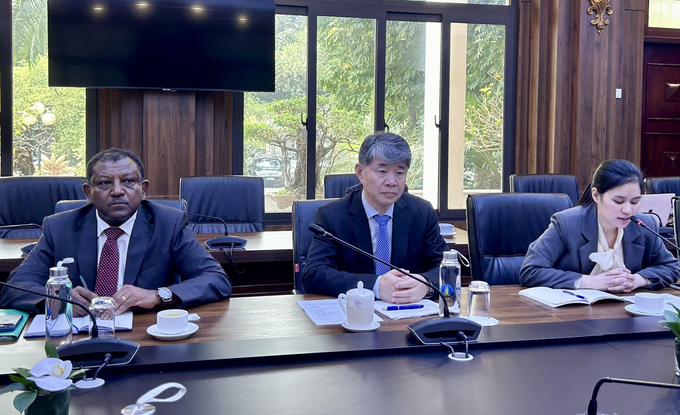
Mr. Hua Liu, Deputy Director General of IAEA (middle) asked the Ministry of Agriculture and Rural Development to establish a collaborative mechanism for cooperation to improve the use of atomic energy in agriculture. Photo: Linh Linh.
"We have separate projects in agriculture, food security, and veterinary care. But now, with the Atom4food effort, all of these concerns will be combined into what we term a strategic solution," Mr. Liu explained.
The initiative is divided into six main points: mutation breeding to create new varieties that can withstand harsh climate conditions; isotope techniques to improve water and soil quality in agriculture; atomic energy technology to enhance resistance in veterinary health; improved nutrition for agricultural products; sterile insect technique; and ensuring food security and safety.
Mr. Hua Liu, Deputy Director General, asked the Ministry of Agriculture and Rural Development to establish a collaborative mechanism for cooperation to improve the use of atomic energy in agriculture. He stressed member nations' engagement, particularly Vietnam, in the food security program, which is always appreciated.
"The Ministry of Agriculture and Rural Development oversees the whole national agricultural sector. Therefore, the Ministry's participation in this project is quite vital. If we previously collaborated individually in disciplines such as veterinary medicine, insecticides, and food irradiation, we can now work together under a single program entity, cooperating not only with important agencies but also with farmers," Mr. Liu stated.
The IAEA's Deputy Director General also praised Deputy Minister Phung Duc Tien's guidance and leadership, as well as the Ministry of Agriculture and Rural Development's leadership, in the three-way cooperation with Laos and the IAEA to control diseases and cross-border diseases in the region.
Responding to the IAEA leadership's views, Deputy Minister Phung Duc Tien noted that, while accounting for only 12%, agriculture is recognized as Vietnam's economic backbone. The Ministry of Agriculture and Rural Development appreciates the practical aspects of the IAEA project with Vietnamese agriculture and would like to engage experts from your side to help concretize cooperation.
Translated by Dieu Linh
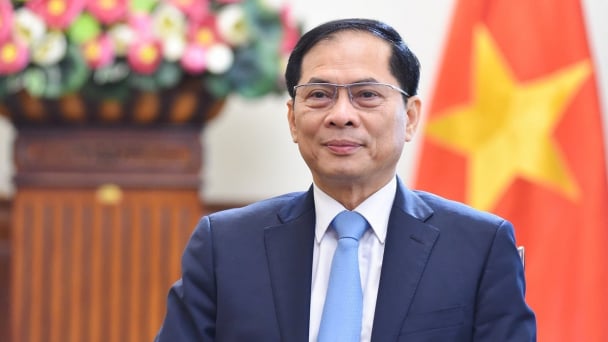
(VAN) According to Deputy Prime Minister Bui Thanh Son, through this P4G Summit, Vietnam aims to convey the message of transforming its growth model towards rapid and sustainable development.
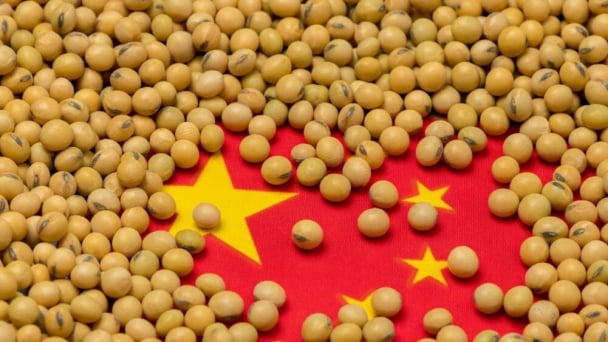
(VAN) Soybean production has been a priority for China to ensure food security, with increased soybean cultivation and yields highlighted in the annual No. 1 Central document.

(VAN) Vietnam Sea and Islands Week 2025 is expected to take place in Quang Binh, featuring a series of meaningful activities aimed at protecting the ocean through green technology solutions.
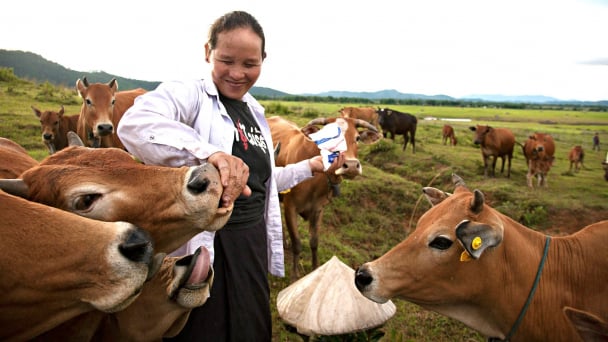
(VAN) The One Health approach is no longer merely an option, as increasingly complex challenges confront health and food systems.
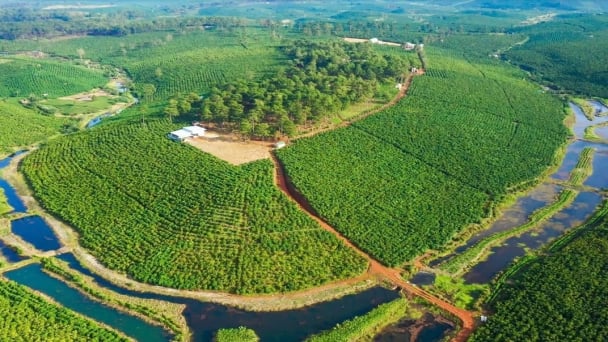
(VAN) The project promoting sustainable coffee production, with a focus on waste management and raising farmers’ awareness, has achieved many positive results after nearly two years of implementation.
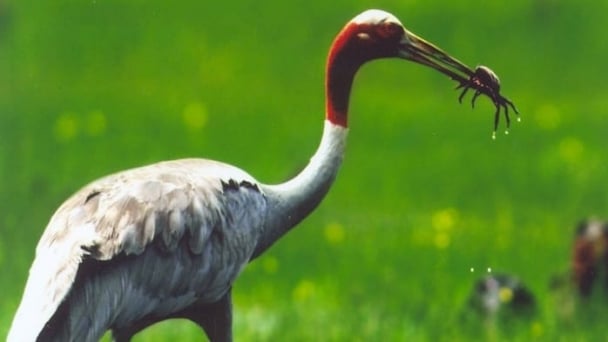
(VAN) Transferring and receiving 6 individuals of the red-crowned crane from Thailand to Vietnam marks a significant milestone in the conservation efforts for this species.
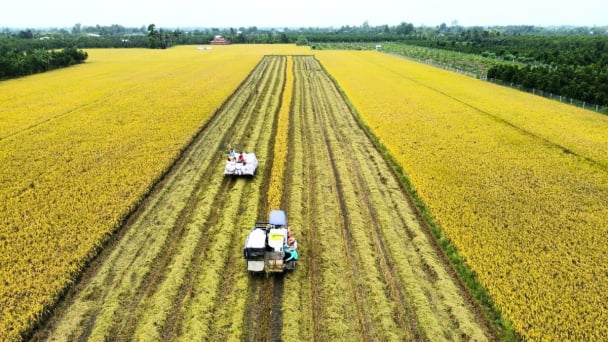
(VAN) After more than a year of implementation, the One Million Hectares of High-Quality, Low-Emission Rice project has completed the first steps, but it needs breakthrough solutions to deepen impacts in the upcoming phase.